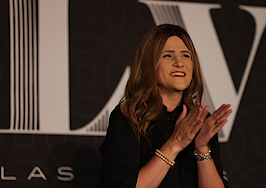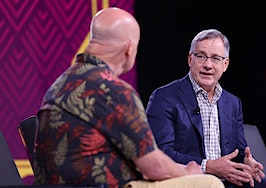Inman events are the best way to connect, learn and grow. Join us this week, Oct. 26-28, for Inman Connect Las Vegas, in-person or virtually. Then, continue to gain insights, strategies, and tactics to keep your business growing and make 2022 your best year ever with a full line-up of 2022 events! Save the dates, and register now!
Side’s website says it’s “taking boutique real estate nationwide.”
Its founder and CEO, Guy Gal, drove home that message in an interview at Connect Las Vegas with Inman reporter Jim Dalrymple II.
Gal spent the session, “What Do Top Producing Agents Actually Need,” communicating the value in his unique model’s ability to recruit the best agents, and position them to thrive. He reiterated that “big brokerages” are set up to empower part-timers to carry most of the weight.
Dalrymple asked how Side augments its agents’ success.
“Philosophically, the biggest constraint to an agent getting new business is not a lack of opportunity,” he said. “They’re constrained by capacity. They don’t sell houses, they sell time. They’re in the service business.”

Dalrymple, Gal; Photo by AJ Canaria of MoxiWorks
Gal explained that when an agent gets tapped out on productivity, they supplement that by building a team.
“So if we partner with a top producer, our first order of business is to help transform them into a team. Now, the agent is more than one person.”
Side can help established high-performing teams expand, too.
The company’s premise rests on advising agents to become teams, and teams to become companies. Side helps its agents establish boutique brands when needed, and take control of their business. In short, they want to flip the traditional brokerage model that relies on agents being vendors to brokers.
“No agent has ever joined Side, we join them,” Gal said.
Dalrymple wanted to know if Side was betting too much on teams.
“It’s more of a belief than a bet, and that belief is grounded in the question, ‘How do you best serve the consumer?'”

Gal; Photo by AJ Canaria by MoxiWorks
Gal claims that 70 percent of the transactions done today are done by part-time agents, and that’s not best of consumers, but it’s what name-brand brokerages leverage to remain successful.
“Most people don’t know that. It’s a very big secret that all the brokerages keep to themselves,” he said. “The big brands act as a device to make it possible for casual agents to actually do the lion’s share of the business across the industry.”
To remedy that, Gal said, it has to be flipped so that 70 percent of the deals are done by fully committed teams. And that’s done by becoming a boutique brand, Gal said.
“To the consumer, that becomes a signal that cuts through the noise that is the [current] real estate industry.”
Dalrymple asked why the Side model is better equipped to foster growth than a “big-brand” team? There are plenty of high performing teams at companies like Compass, RE/MAX and Century 21.
“Look, our partners would have eventually, probably, maybe grown to where they are today by themselves, but it would’ve taken way longer, cost a lot more, been more inconsistent, and with more trial and error,” Gal said.
Side was motivated to form five years ago because traditional brokerages aren’t designed to serve the interests of the top producer. Gal believes they’re predicated on serving the needs of the average producing agent.
“These legacy players extract way more value than they actually create,” he said, “that should not exist.”
Have a technology product you would like to discuss? Email Craig Rowe
Craig C. Rowe started in commercial real estate at the dawn of the dot-com boom, helping an array of commercial real estate companies fortify their online presence and analyze internal software decisions. He now helps agents with technology decisions and marketing through reviewing software and tech for Inman.







